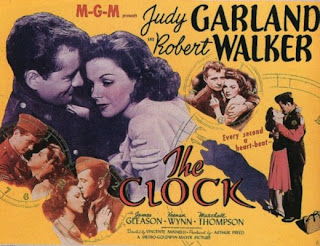 Produced during--or in this case, right at the very end of--WWII to, like many other films during the time, to bolster the war effort, The Clock is a classic Minnelli, constructed with equal lyricism evident in Minnelli's musicals such as Gigi or Meet Me in St. Louis applied to the romantic/melodrama non-musical format. A soldier goes on a pass in New York City, but finds a city cold and crowded until she meets another lonely person from a different world (in her case, a Midwestern transplant desperate to be a native--kinda like Sex and the City). In a short span of a day (or is it a few days? I don't remember) they familiarize, fall in love, and marry before they are separated by war. The Clock is a precursor to many modern movies that deal with urban alienation and the existential crises of human beings trapped between the machinations of history and the great men that drive it. His crowd scenes are intense--swirling camerawork, frames filled to the brim of walking/running feet, bumping against each other but not necessarily meeting each other--and lorded over by the machine that define and threaten to destroy modern life: the clock, which has regimented life and compartmentalized moments and signifcant times in one's lifespan into sconds, minutes, hours. But unlike Harry Lime's last minute gesture of desperation, the two lovers raise their hands in a promise that through it all, they will transcend their mechanical reality. It may not fall within the philosophical confines of film noir, but this cheery culmination of a sordid reality is just as defiant and just as strong a statement against that very march of time as the dark and pessimistic tone that American cinema will soon take.
Produced during--or in this case, right at the very end of--WWII to, like many other films during the time, to bolster the war effort, The Clock is a classic Minnelli, constructed with equal lyricism evident in Minnelli's musicals such as Gigi or Meet Me in St. Louis applied to the romantic/melodrama non-musical format. A soldier goes on a pass in New York City, but finds a city cold and crowded until she meets another lonely person from a different world (in her case, a Midwestern transplant desperate to be a native--kinda like Sex and the City). In a short span of a day (or is it a few days? I don't remember) they familiarize, fall in love, and marry before they are separated by war. The Clock is a precursor to many modern movies that deal with urban alienation and the existential crises of human beings trapped between the machinations of history and the great men that drive it. His crowd scenes are intense--swirling camerawork, frames filled to the brim of walking/running feet, bumping against each other but not necessarily meeting each other--and lorded over by the machine that define and threaten to destroy modern life: the clock, which has regimented life and compartmentalized moments and signifcant times in one's lifespan into sconds, minutes, hours. But unlike Harry Lime's last minute gesture of desperation, the two lovers raise their hands in a promise that through it all, they will transcend their mechanical reality. It may not fall within the philosophical confines of film noir, but this cheery culmination of a sordid reality is just as defiant and just as strong a statement against that very march of time as the dark and pessimistic tone that American cinema will soon take. Monday, August 18, 2008
The clock (Vincente Minnelli, 1945)
 Produced during--or in this case, right at the very end of--WWII to, like many other films during the time, to bolster the war effort, The Clock is a classic Minnelli, constructed with equal lyricism evident in Minnelli's musicals such as Gigi or Meet Me in St. Louis applied to the romantic/melodrama non-musical format. A soldier goes on a pass in New York City, but finds a city cold and crowded until she meets another lonely person from a different world (in her case, a Midwestern transplant desperate to be a native--kinda like Sex and the City). In a short span of a day (or is it a few days? I don't remember) they familiarize, fall in love, and marry before they are separated by war. The Clock is a precursor to many modern movies that deal with urban alienation and the existential crises of human beings trapped between the machinations of history and the great men that drive it. His crowd scenes are intense--swirling camerawork, frames filled to the brim of walking/running feet, bumping against each other but not necessarily meeting each other--and lorded over by the machine that define and threaten to destroy modern life: the clock, which has regimented life and compartmentalized moments and signifcant times in one's lifespan into sconds, minutes, hours. But unlike Harry Lime's last minute gesture of desperation, the two lovers raise their hands in a promise that through it all, they will transcend their mechanical reality. It may not fall within the philosophical confines of film noir, but this cheery culmination of a sordid reality is just as defiant and just as strong a statement against that very march of time as the dark and pessimistic tone that American cinema will soon take.
Produced during--or in this case, right at the very end of--WWII to, like many other films during the time, to bolster the war effort, The Clock is a classic Minnelli, constructed with equal lyricism evident in Minnelli's musicals such as Gigi or Meet Me in St. Louis applied to the romantic/melodrama non-musical format. A soldier goes on a pass in New York City, but finds a city cold and crowded until she meets another lonely person from a different world (in her case, a Midwestern transplant desperate to be a native--kinda like Sex and the City). In a short span of a day (or is it a few days? I don't remember) they familiarize, fall in love, and marry before they are separated by war. The Clock is a precursor to many modern movies that deal with urban alienation and the existential crises of human beings trapped between the machinations of history and the great men that drive it. His crowd scenes are intense--swirling camerawork, frames filled to the brim of walking/running feet, bumping against each other but not necessarily meeting each other--and lorded over by the machine that define and threaten to destroy modern life: the clock, which has regimented life and compartmentalized moments and signifcant times in one's lifespan into sconds, minutes, hours. But unlike Harry Lime's last minute gesture of desperation, the two lovers raise their hands in a promise that through it all, they will transcend their mechanical reality. It may not fall within the philosophical confines of film noir, but this cheery culmination of a sordid reality is just as defiant and just as strong a statement against that very march of time as the dark and pessimistic tone that American cinema will soon take.
Subscribe to:
Comments (Atom)

